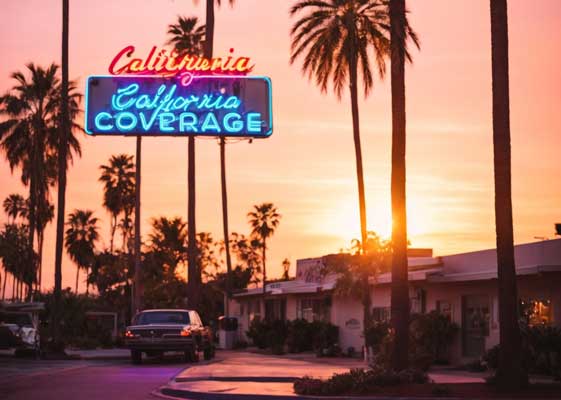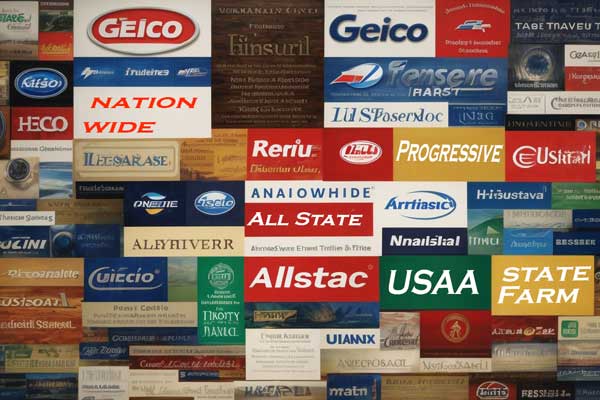Auto Insurance Coverage in California
mandatory coverage tailored for Golden State roads.

The Right Auto Insurance Coverage
Having the right auto insurance coverage in California is essential and it’s also the law. California law requires all drivers to carry, in the least, minimum liability insurance. However, many experts recommend getting more than just the minimum to properly protect yourself financially.
This article will provide an overview of California’s car insurance laws, tips for getting the best coverage at an affordable price, and examples from 10 top insurers operating in the state.
California Minimum Car Insurance Requirements
Under California law, all drivers must carry the following minimum auto insurance coverage:
Bodily Injury Liability Coverage:
$15,000 per person, $30,000 per accident. This coverage helps pay for injuries to others for which you are deemed responsible.
Property Damage Liability Coverage:
$5,000 per accident. This helps pay for property damage to others that you cause.
Uninsured/Underinsured Motorist Bodily Injury Coverage:
$15,000 per person, $30,000 per accident. This helps cover costs if you are injured by a driver with no or insufficient insurance.
Drivers who fail to maintain this minimum required coverage may face expensive fines, license or registration suspension, and other serious consequences. Having only the minimums leaves you vulnerable to potentially huge out-of-pocket costs if you cause an accident, so maintain continuous California car insurance coverage.
Recommended Additional Car Insurance Coverage in California
Recommended Additional Car Insurance Coverage in California

- Comprehensive and Collision Coverage: Comprehensive covers damage from events like theft, vandalism, or severe weather while collision covers damage from accidents. Though not required by law, experts recommend carrying both.
- Rental Reimbursement: Pays for a rental car if your vehicle is being repaired after a covered loss.
- Gap Insurance: This covers the “gap” between what your car is worth and what you still owe if it’s totaled. Prevents owing money on a car that’s been totaled.
- Uninsured/Underinsured Motorist Property Damage: This covers damage to your car caused by an uninsured or underinsured driver.
- Medical Payments Coverage: Provides coverage for medical treatment due to an accident, regardless of who is at fault.
- Umbrella Insurance: Provides additional liability coverage beyond your regular auto policy limits if you are sued. Useful for high-net-worth individuals.
Your specific coverage needs depend on your situation – where you live, what car you drive, your budget, and other factors. Work with a licensed agent to select optimal coverage limits and options.
You should also be aware that California is an at-fault state, meaning the driver who causes the accident is liable for any damages. Having higher liability coverage protects your assets in the event you are sued.
How Insurance Rates are Determined in California
In California, insurance companies determine your premium based on:

- Driving Record: Tickets, accidents, DUIs, and other violations raise rates substantially. Maintaining a clean record saves significantly.
- Vehicle Type: Insuring a new luxury car or high-performance car costs more than an older sedan. Sports cars and large SUVs often have the highest premiums.
- Coverage Limits and Deductibles: Higher liability coverage limits and lower deductibles mean higher premiums. Optimize these based on your budget and needs.
- Age: Statistics show drivers under 25 and over 70 have higher accident rates. Expect higher premiums at both ends of the age spectrum.
- Location: Insurance rates are based on actuarial data tied to your garaging zip code. Urban areas typically have higher premiums than rural zones.
- Gender: Statistics show male drivers under 25 have more accidents than female counterparts, which can raise rates. The difference evens out as drivers age.
- Credit History: California allows the use of credit-based insurance scores as a rating factor. Poor scores can contribute to higher premiums.
- Mileage: Policies with lower annual mileage limits may qualify for discounted rates.
- Marital Status: Married couples often qualify for multi-car and multi-policy discounts unavailable to single households.
While some factors are out of your control, focusing on a clean driving record, moderate coverage limits, and high deductibles can help keep rates affordable. Comparison shopping is important to find the best rate.
Tips for Saving Money on California Car Insurance Coverage
Here are some top ways California drivers can save money on their auto insurance premiums:

- Compare quotes frequently: Rates and discount offers change all the time, so shop around at least twice a year. Get quotes from independent agents and captive agents. Online insurance marketplaces like Cover Hound and The Zebra can quickly compare dozens of company rates at once.
- Ask about discounts: Taking defensive driver courses, maintaining good credit, insuring multiple cars/drivers on one policy, paying premiums upfront, and using anti-theft devices can all qualify you for premium discounts. Ask your insurer what’s available.
- Optimize coverage limits: Consider raising deductibles and lowering unnecessary coverage limits. For example, you may be able to increase your collision deductible to $1,000 or more to save substantially.
- Drop unnecessary extras: Things like rental reimbursement coverage or roadside assistance can possibly be removed if you don’t need those features.
- Maintain a good driving record: Avoid accidents, traffic violations, and DUI/DWI. Keeping a clean driving history is one of the biggest ways to save.
- Reduce commuting miles: Cut back your mileage, particularly commuting miles, to qualify for lower rates.
- Ask about group insurance: Alumni, professional, occupational, and business associations may offer group insurance programs with lower rates. It doesn’t hurt to ask.
With some effort, California drivers can realize significant savings on their car insurance premiums while still getting quality coverage. One of the best ways to get lower rates is by comparing rates. You should compare at least ten quotes before buying an auto insurance policy in California.
Sample California Car Insurance Quotes from Top Providers
To give you an idea of typical auto insurance rates in California, here are sample quotes a 30-year-old driver might receive. Quotes are based on driving a 2015 Honda Civic EX with 50/100/50 coverage limits and a $500 deductible.
- Geico – annual premium: $1,479
- Allstate – annual premium: $1,712
- State Farm – annual premium: $1,623
- Progressive – annual premium: $1,985
- USAA – annual premium: $1,301 (USAA is for qualifying military families)
- Liberty Mutual – annual premium: $1,997
- Nationwide – annual premium: $1,838
- Travelers – annual premium: $1,642
- AAA – annual premium: $1,568
- The Hartford – annual premium: $1,801

So be sure to invest time in getting multiple free quotes and finding the right balance of premium, coverage, and insurer reputation. With smart shopping, California drivers can secure quality, affordable auto insurance.
The Final Word On Car Insurance Coverage in California
Getting car insurance coverage in California involves understanding the state’s minimum requirements, comparing plans from different providers, and selecting the right policy for your needs and budget.
The cost of auto insurance coverage in California varies by factors like your age, driving record, location, and type of car. Getting quotes from insurers like State Farm, GEICO, Progressive, and Mercury can help find the best rate in California.
Make sure to compare the same levels of coverage when shopping rates and plans. To get a quote where you live fill out an online application. Save more on California car insurance coverage today with direct rates.
